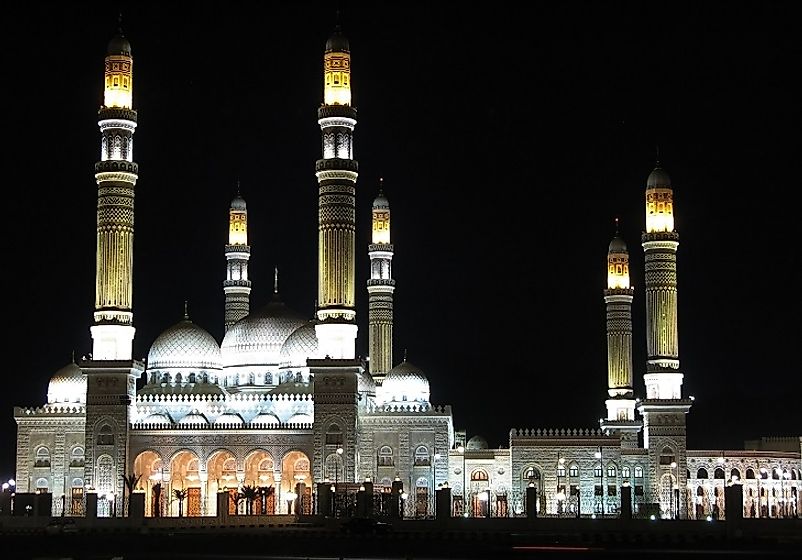Religious Beliefs In Yemen

Yemen is an overwhelmingly Muslim nation, with the most common teachings being Shafi’i Sunni and Zaidi Shia Islam. Islam is the official religion in Yemen and legislation is firmly founded in Sharia Law. The constitution allows for the freedom of worship, and other religions other than Islam are not required to register but have an obligation to obtain permission to build worship places. Islam is taught in public schools, although the Yemen government monitors Islamic education to curb unregistered schools which may promote extremism. Punishment exists, however, for Muslims who convert to other religions, and minority religious groups are not permitted to convert Muslims. The most notable religious tensions in Yemen exist between the Sunni and Shia Muslims, fueled by the political landscape of the country. The different religious beliefs practiced in Yemen today are discussed below.
Sunni Islam
Sunni Islam is divided into three groups in Yemen, namely the Shafi’i, Maliki, and Hanbali Muslims. Sunni Muslims make up over half the country’s Muslim population, with the most dominant branch being the Shafi’i school of thought. The Sunni Muslims are mainly concentrated in the southern region of the country. Shafi’i school of thought was introduced to Yemen by its founder, Muhammad ibn Idris al-Shafi’i during his stay in the country. Maliki Muslims in Yemen rely on the Quran and hadiths as the chief religious texts while the Hanbali Muslims make up a small percentage of the Sunni Muslims in Yemen.
Shia Islam
Around 44% of Yemen’s Islamic population adheres to Shia Islam, the dominant branch being Zaidi Islam. Zaidism is the oldest branch of Shia Islam, and it was fashioned around the teachings of Zayd ibn Ali. The Zaidis believe that any Muslim can become an Imam and they reject the infallibility of the Imams. The Zaidi State in Yemen was established in 890, in the north of the country. For years, the Zaidis were at the center of the economic and political control of Yemen’s highlands. The Zaidis’ power was challenged, however, with the unification of Yemen in 1990, and the subsequent presence of what were now the majority Sunni Muslims. Alongside the Zaidis are the Twelver Shia Muslims and the Ismaili Shia Muslims. The Ismaili Muslims are mainly located in the Jabal Haraz region, and they avoid generally political conflicts.
Christianity
Several thousand Christians live in Yemen, most of whom are either expatriates or refugees. Most of the churches are found in the city of Aden, and are generally affiliated with either Roman Catholic or Anglican denominations of Christianity. The Ethiopian Orthodox Church is also found in Yemen, due to the Ethiopian refugees. The Russian Orthodox Church is also present in Yemen alongside an American Baptist Congregation. Although extremism is not widespread in Yemen, Christians in the country have reported on societal discrimination and hostility.
Judaism
Although several accounts exist regarding a much earlier arrival of Jews into Yemen, archaeological findings have placed the emergence of Judaism in Yemen during the rule of the Himyarite Kingdom. Jews in Yemen enjoyed a high level of prosperity in medieval times, and even the Himyarite King Abu-Karib Asad Toban became a Jew convert in the late 5th Century. Persecution of Jews began with the advent of Islam to Yemen, especially under the centuries-long Zaidi rule. Immigration by Jews from Yemen started in the 19th Century, mostly to Palestine and Israel. Only a small congregation of Jews lives in modern day Yemen, in the towns of Bayt Harash and Sana’a and they face continuous hostility.
Baha’i Faith
A small population in Yemen adheres to the Baha’i faith. The religion is relatively new in Yemen, having been founded in the 19th Century in Iran and introduced to Yemen by its believers. Among the Baha’i beliefs are oneness with God, universal justice, and harmony between religion and science. The Baha’i adherents are perhaps the most discriminated minority groups in Yemen. Baha’i believers in Yemen are occasionally imprisoned, mistreated, and tortured.
Hinduism and Other Faiths in Yemen
Hinduism was introduced into Yemen by immigrant Indian and Nepalese workers. Hinduism in Yemen largely goes under the radar, and is only practiced by small congregations scattered around the country. An estimated 150,000 Hindus reside in Yemen. Other sectarian religious faiths are practiced by ethnic immigrants such as Somalis, Turks, and Indians.







